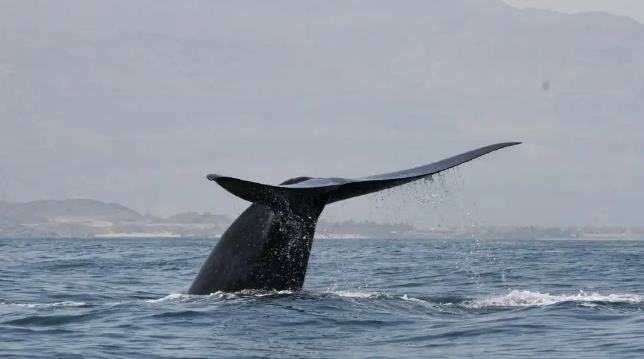
Previously Unknown #Whale Population Discovered in #Indian Ocean Thanks to Their Distinct Song
weather.com/en-IN/india/en…
(📸:Robert Baldwin/Environment Society of Oman)
weather.com/en-IN/india/en…
(📸:Robert Baldwin/Environment Society of Oman)

In a rather surprising, yet exciting discovery, researchers have spotted a new population of blue #whales swimming in the western #IndianOcean. The discovery is unique as the population was spotted from the unusual song sung by these exotic sea creatures.
Blue whales or #Balaenoptera musculus are the largest living animals on the planet and they use songs to communicate and socialise. They are often identified by their unique low-frequency sounds, which can be louder than a jet engine, with the pitch reaching up to 188 decibels.
Dr Salvatore Cerchio, Director of the #African Aquatic Conservation Fund's Cetacean Program, first heard and recorded the sound of this unknown population in 2017, while he was working on a research project on Omura's whales in the Mozambique Channel off #Madagascar.
#wildlife
#wildlife
Furthermore, the team of researchers also noted the similar distinct sounds from the western #ArabianSea, off the coast of Oman, and the Chagos Archipelago in the central Indian Ocean. These locations are separated by a distance of nearly 3,500 kilometres of ocean.
#wildlife
#wildlife
Until now, it was assumed that the region had just one single population of blue #whales in the northern #Indian Ocean. Therefore, all the #whales found in this particular area and the Arabian Sea—found off Sri Lanka and ranges into the southcentral Indian Ocean.
#wildlife
#wildlife
The blue whale populations were reportedly on the verge of extinction around the globe during the 20th century. The #ArabianSea was a prime target for whaling—a practice of hunting and killing whales for products like meat and oil.
The number of blue #whales dropped significantly from 2,50,000 to around 1,000 by the 1950s. Over the past few decades,the population is slowly growing after the signing of a global moratorium on commercial whaling in 1982.
(📸:Craig Hayslip/Oregon State University/NASA)
(📸:Craig Hayslip/Oregon State University/NASA)

• • •
Missing some Tweet in this thread? You can try to
force a refresh














